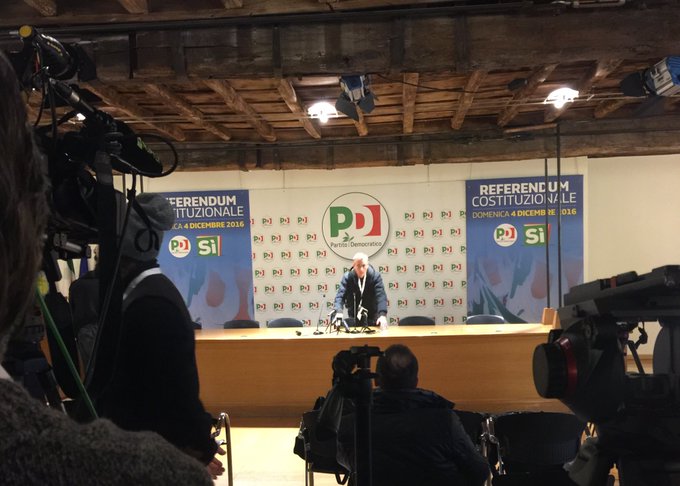Italy
referendum: exit polls predict defeat for Renzi after Austria rejects far right
– live
Join us for
coverage of crucial votes as exit polls suggest Italian PM has lost high-stakes
referendum after Austria elects left-leaning president over Norbert Hofer
·
Renzi’s
future in the balance amid high turnout in Italy referendum
The Italian prime minister, Matteo Renzi, and his wife, Agnese Renzi, cast their ballots in a polling station in Pontassieve, near Florence. Photograph: Maurizio Degl Innocenti/EPA
Italy’s prime minister, Matteo Renzi, is expected to address the nation shortly after suffering what looks like a heavy defeat in the constitutional referendum which he called – and after which he promised to resign if he lost.
Renzi has just tweeted to thank his supporters “anyway”, and to confirm he will be speaking live from Palazzo Chigi in a few minutes. “Long live Italy! PS I’m coming,” he concludes.
Matteo Renzi(@matteorenzi)
Grazie a tutti, comunque. Tra qualche minuto sarò in diretta da Palazzo Chigi. Viva l'Italia!December 4, 2016
Ps Arrivo, arrivo😀
The Northern League’s Matteo Salvini is clearly ecstatic with the No camp’s sweeping victory, writes Stephanie Kirchgaessner in Rome. The xenophobic Salvini clearly saw the victory as part of the right wing’s onward march:
Viva Trump, viva Putin, viva la Le Pen e viva la Lega! https://www.facebook.com/salviniofficial/videos/10154235160448155/ …
But, explains Stephanie, even if it looks like Renzi was indeed trounced, that does not necessarily mean that every Italian who voted No was voting in favour of Salvini or his brother-in-arms, the M5S’s Beppe Grillo:
While some saw the plebiscite as a vote of no confidence in the prime minister, others – including those on the left and some within Renzi’s own party – saw the referendum as strictly a question on the topic at hand: whether or not to change the constitution.Indeed, some – like a former communist the Guardian chatted with yesterday – voted No precisely because of concerns that rightwing forces were gaining traction. The reforms were seen by these opponents as weakening Italy’s democracy and potentially handing too much power to whoever inhabits the prime minister’s residence at Palazzo Chigi.
Updated
Having had to commiserate with Norbert Hofer, the losing far-right candidate in Austria’s presidential election, Marine Le Pen, the leader of France’s far-right Front National, cheers Matteo Salvini’s far-right Lega Nord – which backed the victorious No camp in Italy’s referendum:
Bravo à notre ami @matteosalvinimi pour cette victoire du NON ! MLP #referendumcostituzionale
Advertisement
The Italian interior ministry has a live results page, which you can visit here.
This is what it looked like almost exactly an hour after the polls closed:
Sigrun Davidsdottir(@sigrunda)
#italyreferendum : votes being counted, according to the Italian Ministry of Interior: https://t.co/Rzi2TybY38 h/t @woolclippic.twitter.com/pNJeQ5Vp2mDecember 4, 2016
The first projection based on the actual vote count in Italy’s constitutional referendum shows Matteo Renzi may have suffered an even heavier defeat, Reuters reports:
The projection by the Piepoli Institute/IPR for state broadcaster RAI estimated those voting ‘Yes’ to back the reform at 39-43%, compared with 57-61% for ‘No’. The projection pointed to an even wider defeat for Renzi than was suggested by three exit polls published immediately after polls closed.
Updated
Euro falls on forex markets following exit polls
My colleague Graeme Wearden has this on the reaction of Europe’s single currency to news of the Italian prime minister’s possible referendum defeat:
Europe’s single currency took an immediate dive on the foreign exchange markets when the referendum exit polls were released, but it’s not a full-blown crash. The euro has fallen by one cent against the US dollar, or almost 1%, to $1.0573.Some economists have warned that a No victory would hamper efforts to recapitalise Italy’s banks, and undermine efforts to reform the country’s economy, which has been dogged by weak growth for the last 15 years.
The Guardian’s Stephanie Kirchgaessner has sent her initial analysis of the first exit polls in Italy’s constitutional reform referendum, which predict Italian prime minister Matteo Renzi is heading for defeat:
If the exit polls hold, the results will be read as a victory not only for the anti-establishment M5S, but for Matteo Salvini’s anti-immigrant Northern League. Voter turnout was especially strong in areas of Lombardy and Veneto that are considered strongholds of the Northern League, or Lega Nord, as it is known in Italy.Renzi is expected to speak at midnight in Italy. Lorenzo Guerini, a top official from the prime minister’s PD party, declined to comment on the results in a brief statement in which he said the high voter turnout was a positive sign for the country’s democracy.The possible win for the No camp could rattle European and global markets that had been rooting for a Renzi victory and will not want to see the country besieged by more economic and political uncertainty just as its economy was – slowly – improving.In the days leading up to the vote, unnamed bankers expressed concerns in media reports that a no win could even destabilise plans to rescue Banca Monte dei Paschi of Siena.
Updated
And here’s what that looks like in graphic form, together with the turnout – 69.1%. Remember, these are very much provisional figures based on exit polls, which are often unreliable in Italy.
Projections of the result based on the actual vote count can now be expected at regular intervals of around 30 minutes, with the first due before midnight. They should become increasingly accurate as the night goes on.
Yannis Koutsomitis(@YanniKouts)
#Italy #referendumcostituzionale very early official results:December 4, 2016
Yes 46.6%
No 53.4% pic.twitter.com/N4EwGf1bnQ
Advertisement
Here is Reuters’ first take on the predicted heavy defeat for Italian prime minister Matteo Renzi in the referendum on constitutional reforms on which he has staked his political future:
Italian Prime Minister Matteo Renzi has suffered a heavy defeat in a referendum over his plan to reform the constitution, according to exit polls.Renzi has said he would resign if Italians rejected his plan to reduce the role of the upper house Senate and claw back powers from regional authorities. He is due to address the nation at around midnight (2300 GMT).An exit poll by the Piepoli Institute/IPR for state television station RAI, estimated those voting ‘Yes’ to back the reform at 42-46 percent, compared with 54-58 percent for ‘No’.Two other polls - by Tecne’ for privately owned TV channel Mediaset, by EMG Acqua for La 7 - gave ‘No’ a similar lead of at least 10 points. Voting ended at 11 p.m.
First exit polls: victory for No campaign
Italy’s exit polls are notoriously unreliable, says Stephanie Kirchgaessner in Rome, but early indications are showing a win for No. Rai News estimates 58-54% of Italians favoured No, while 46-42% supported Yes. If the results hold, it will be a major defeat of Matteo Renzi and Italy’s centre-left Democratic party and a big win for his opponents in the Five Star Movement and the far-right Northern League.
Polls close in high-stakes Italy referendum
Polling stations have just closed in Italy, where voters are having their say in a referendum on constitutional reform backed by prime minister Matteo Renzi and most of his supporters in the Democratic party but opposed by his rivals on the left and right, including Beppe Grillo’s M5S, in large part because they want to force Renzi out.
Stephanie Kirchgaessner, the Guardian’s Rome correspondent, says:
With just minutes to go before the polls close, pundits in Italy are saying one thing is clear: the constitutional referendum was treated as a general election and showed Italians were highly motivated to make their voices heard. Now we have to wait to see what it is they’re telling us.
Updated
The Guardian’s foreign affairs analyst Simon Tisdall has this to say about what Alexander Van der Bellen’s victory in Austria’s presidential elections means for Europe in the wake of Britain’s vote to leave the EU and Donald Trump’s victory in the US:
The sigh of relief that followed Alexander Van der Bellen’s victory in Austria’s rerun presidential election on Sunday could be heard all over Europe. After the twin traumas of Trump and Brexit, centrist parties, social democrats and liberals of all stripes had feared another triumph for the advancing forces of nativist populism represented by Van der Bellen’s rival, the far-right Freedom party’s Norbert Hofer.[But] comforting though Van der Bellen’s victory may be for European progressives, the fact remains that slightly more than 46% of Austrian voters backed Hofer’s candidacy. That figure reveals a nation that is sharply divided, and overall, more rightwing and intolerant in its outlook than previously.
You can read his full commentary here.
Updated
A quick reminder of what exactly Italians are supposed to be voting on today (as is the way with referendums, many will of course be voting on something else altogether), courtesy again of Stephanie Kirchgaessner:
A series of major changes to the Italian political system. These reforms, which affect a third of the Italian constitution, have already been approved by parliament but by a slim margin, thus requiring that they also be passed by referendum.Under the current system, which was created under Italy’s 1948 constitution, there are two chambers of parliament with directly elected lawmakers, the Chamber of Deputies and the Senate. Both have equal power and both must agree on legislation before it is passed. This means it can take a very long time for things to get done.Under the proposed reforms, the Senate would lose almost all its power – the number of senators would be reduced from 315 to 100, and the remaining senators would no longer be elected directly. Instead, the 100 would be made up of lawmakers selected by regional assemblies. Some mayors would also serve as senators.If the yes campaign wins, most laws could be passed, including Italy’s budget, by the Chamber of Deputies without consulting the Senate, arguably making the whole process of passing laws a lot easier. The Senate would only have the power to weigh in on big issues such as other constitutional reforms and the ratification of EU treaties.
Advertisement
Here’s the Guardian’s Rome correspondent Stephanie Kirchgaessner’s latest take on what the high turnout in Italy’s constitutional referendum could mean ... In a word (or four), no one really knows:
Figures released by the interior ministry showed that about 55% of eligible voters had cast their ballots as of 7pm. However, the relatively high turnout did not clearly favour the centre-left government’s campaign or the opposition, led by the anti-establishment Five Star Movement (M5S), because both sides have strongholds in high-voting regions.
Updated
Italy’s prime minister Matteo Renzi will address the nation at around midnight (2300 GMT), Reuters reports, an hour after polls close in the high-risk referendum on constitutional reform on which he has staked his premiership (he’s said he’ll resign if he loses.)
Exit polls are due to be released as soon as ballots close, but full results are not due until after 2am at the earliest. Some eager souls are already there:




No hay comentarios.:
Publicar un comentario